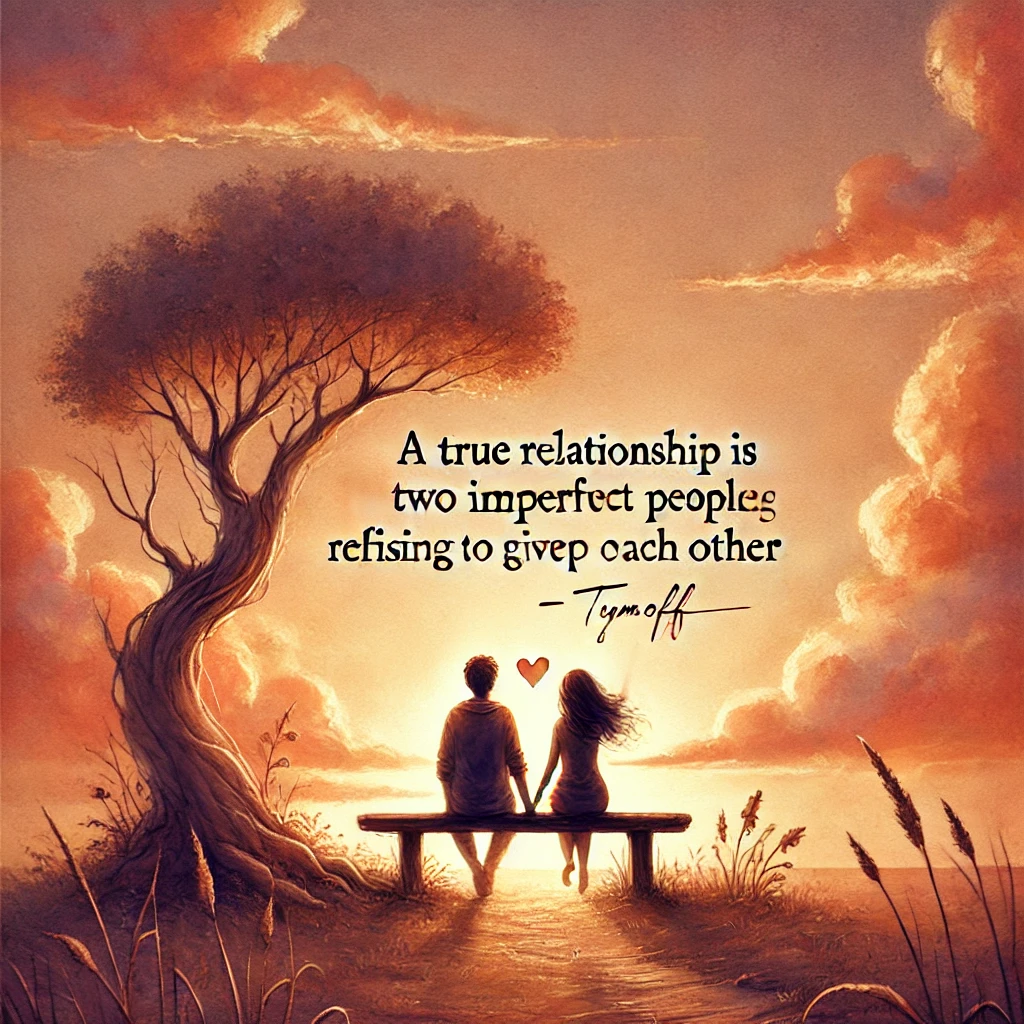Relationships are the cornerstone of human life, offering both profound joys and inevitable challenges. In an era where perfection is often glamorized, the idea that “a true relationship is two imperfect people refusing – Tymoff” reminds us of the core essence of what makes connections genuine and lasting. This phrase encapsulates the beauty of embracing flaws, persistence, and mutual growth within a relationship. Let’s dive deeper into what this concept means and how it shapes the dynamics of enduring partnerships.
Embracing Imperfection: The Foundation of Real Relationships
No individual is perfect, and expecting perfection from oneself or a partner can be a recipe for disappointment. The concept of “two imperfect people refusing” emphasizes the importance of accepting and celebrating imperfections. A true relationship is not about finding a flawless partner but about finding someone whose imperfections complement your own.
Imperfections often manifest in various ways—quirks, habits, or even past mistakes. These flaws can sometimes lead to misunderstandings or conflicts. However, recognizing that these are part of human nature fosters empathy and patience. When two people accept each other wholly, they create a safe space for authenticity. This acceptance builds trust, as both partners know they are valued for who they truly are, rather than an idealized version of themselves.
Refusing to Give Up: The Pillar of Commitment
Relationships thrive on the willingness to persist through challenges. The phrase “refusing” highlights the resilience required to sustain a connection. In a world where instant gratification is prevalent, many people are quick to abandon relationships at the first sign of difficulty. However, true relationships stand apart because both individuals refuse to give up on each other.
Challenges are inevitable in any relationship, whether they stem from external pressures, misunderstandings, or personal growth. The key lies in facing these challenges together. Refusing to give up does not mean tolerating toxic behavior or neglecting self-respect; rather, it signifies a commitment to working through issues constructively. This resilience strengthens the bond, transforming obstacles into opportunities for deeper understanding and connection.
The Role of Communication in Building Strong Relationships
Effective communication is the lifeblood of any relationship. When two imperfect people come together, misunderstandings are bound to occur. Open and honest communication helps bridge gaps and resolve conflicts. It involves not just speaking but also listening—understanding your partner’s perspective without judgment.
Nonverbal communication also plays a significant role. Small gestures, facial expressions, and body language often convey emotions more powerfully than words. When partners are attuned to each other’s nonverbal cues, they foster a deeper emotional connection. This mutual understanding reinforces the “refusing” aspect of the relationship, as both individuals work actively to nurture their bond.
Vulnerability: The Path to Authentic Connection
Vulnerability is often perceived as a weakness, but in relationships, it is a profound strength. Being vulnerable means opening up about fears, insecurities, and emotions. It requires immense courage to show your true self to another person, especially when imperfections are involved.
When both partners embrace vulnerability, they foster a sense of intimacy that goes beyond surface-level interactions. This openness allows for meaningful conversations and shared experiences, creating a foundation of mutual trust. Vulnerability also encourages forgiveness, as it reminds both individuals of their shared humanity and imperfections.
Growth Through Imperfection
One of the most beautiful aspects of a true relationship is the opportunity for mutual growth. Imperfections often serve as catalysts for personal and relational development. When two people commit to each other despite their flaws, they embark on a journey of self-improvement and collective growth.
Constructive feedback plays a vital role in this process. Partners who provide honest yet supportive feedback help each other recognize areas for improvement. This growth is not about changing to meet someone else’s expectations but about becoming the best version of oneself. When both individuals prioritize growth, the relationship evolves into a dynamic and enriching experience.
The Balance Between Independence and Togetherness
While commitment is crucial, maintaining a sense of individuality is equally important. A true relationship thrives when both partners balance their personal needs with the needs of the relationship. This balance prevents codependency and ensures that each individual retains their sense of self.
Independence does not mean isolation; rather, it involves pursuing personal passions, goals, and interests. When both partners support each other’s individuality, they create a relationship built on mutual respect. This respect enhances the connection, as both individuals feel valued for who they are.
The Power of Forgiveness
Forgiveness is a cornerstone of lasting relationships. Imperfections often lead to mistakes, whether intentional or unintentional. Holding onto resentment can erode the foundation of trust and intimacy. Forgiveness, on the other hand, allows both individuals to move forward with a clean slate.
Forgiving does not mean condoning harmful behavior; it involves acknowledging the hurt, communicating feelings, and choosing to let go of grudges. This act of grace strengthens the bond, reminding both partners of their commitment to “refusing” to let challenges define the relationship.
The Role of Shared Values and Goals
While imperfections add depth to relationships, shared values and goals provide direction. A true relationship is anchored in a common vision for the future. Whether it’s building a family, pursuing a shared dream, or supporting each other’s aspirations, having aligned goals fosters a sense of purpose.
Shared values also guide decision-making and conflict resolution. When both partners prioritize the same principles, they navigate challenges with a unified approach. This alignment reinforces the “refusing” mindset, as both individuals remain committed to their shared journey.
The Influence of External Factors
External factors such as societal expectations, cultural norms, and social media can impact relationships. The glamorized portrayals of perfection often create unrealistic standards. However, recognizing the authenticity of “two imperfect people refusing” helps couples stay grounded.
By focusing on their unique connection rather than external influences, partners can cultivate a relationship that aligns with their values and priorities. This perspective fosters gratitude and contentment, allowing them to appreciate the beauty of their imperfect journey.
Conclusion: Celebrating Imperfection and Resilience
“A true relationship is two imperfect people refusing – Tymoff” captures the essence of genuine connections. It is a celebration of imperfection, resilience, and mutual growth. True relationships are not about avoiding challenges but about facing them together with empathy, patience, and unwavering commitment.
In a world that often emphasizes perfection, this philosophy serves as a powerful reminder of what truly matters. It encourages individuals to embrace their flaws, support each other through difficulties, and cherish the journey of building a meaningful bond. Ultimately, a true relationship is a testament to the strength and beauty of two imperfect people who choose each other, time and time again.



